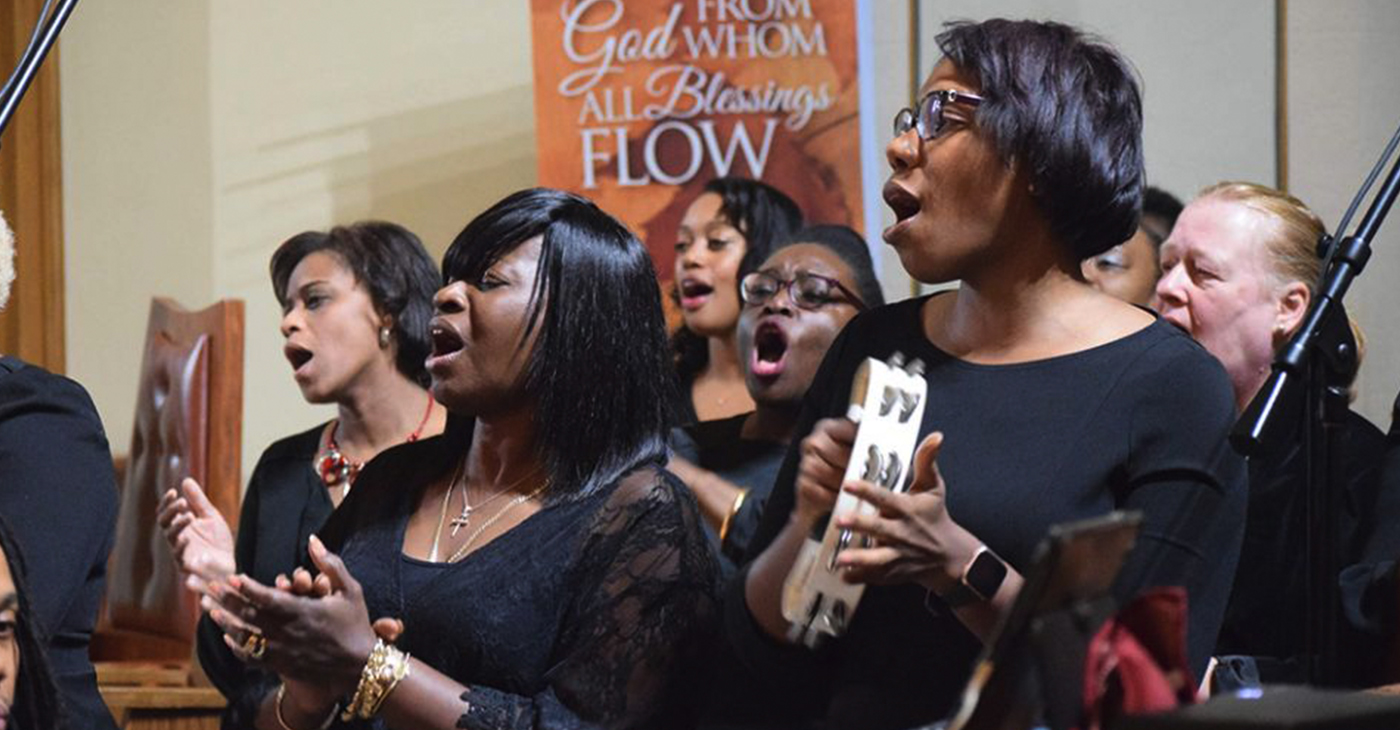Black History
OP-ED: New Study Brings Black Catholics into Forefront
Pew’s 2021 study reports that 46% of Black young adults in Generation Z (ages 18-23 at the time of the survey) seldom or never attend religious services. Organized religion — across denominations — ignores this finding at its peril. The sex abuse crisis has already damaged the church’s credibility across generations. This reality coupled with Pew’s finding that close to half of all young Black American adults rarely or never attend religious services should be a warning to Church leaders that concrete action must be taken now.

By Nia Tia Noelle Pratt
My entire 20-year career has been about ending the erasure of Black Catholics from academic and public discourse.
This is one of the reasons I began the #BlackCatholicsSyllabus and articulated from the outset that the point of the syllabus is to prioritize the voices of Black Catholics in the creation of our own narrative. It’s also why this week’s Pew Research Center report, “Black Catholics in America” is the data I dreamed of having as an undergraduate and graduate student. I also dreamed of having a report like this in the years since I finished graduate school.
Much of my efforts have focused on ending erasure within the Catholic sphere. However, Black Catholics are not just erased from Catholic narratives — they are also erased from discourse on the Black church as well.
This dual erasure is why Pew Research Center’s report is so important. Along with last year’s “Faith Among Black Americans,” this week’s survey on Black Catholics is urgently needed. Both are poised to be regarded as landmark studies.
“Black Catholics in America,” published on March 15, examines Black Catholics within a larger Catholic contest and within the context of “Faith Among Black Americans.”
The new study tells us that 6% of Black Americans are Catholics. While this percentage is admittedly small, it still means that there are nearly 3 million Black Catholics in the U.S.
Millions of people must be included in the conversation about what it means to be Catholic in our country if the conversation is going to be comprehensive. Furthermore, we learn from this study that 20% of Black Americans born in sub-Saharan Africa and 15% of Caribbean-born Black Americans identify as Catholic while only 5% of U.S.-born Black Americans identify as Catholic.
“These numbers tell us that Black Catholics in the United States are not a monolith. These drastically different numbers deserve further consideration by scholars and the United States Conference of Catholic Bishops as well as dioceses and parishes. Church leaders must keep this in mind in ministering to Black Catholics and creating pastoral plans. Similarly, scholars must incorporate this knowledge into their research.
I was not surprised to learn from the full report that only 17% of Black Catholics attend a predominantly Black church and a comparable 18% of Black Catholics report a combination of call-and-response, and other expressive forms of worship during Mass. Part of my research involves examining liturgy as a form of identity work where I’ve discussed just this type of worship experience in detail.
I’ve discussed at length how African American Catholics incorporate music, preaching and Church aesthetics into liturgy in order to create a unique identity as African Americans and as Catholics.
Only 41% of Black Catholics report having heard a homily on race in the 12 months prior to completing the survey and only 31% reported hearing a homily on political engagement in the same time period. The reckoning around systemic racism that we have seen over the last year has demonstrated that it is long past time for the church to regard racism as a pro-life issue.
For this reason, these findings are also a call to action. A thunderous 77% of Black Catholics said that “opposition to racism is essential to what being Christian means to them.”
Many Black Catholics are not getting a message at Mass that they identify as something essential to being a Christian.
This week’s report also tells us that 46% of Black adults who were raised Catholic no longer identify as such. The aforementioned disconnect between the themes Black Catholics hear about at Mass and what they consider essential to being a Christian provides some insight as to why so many Black Catholics leave the church. The results for young adults only exacerbate this situation.
Pew’s 2021 study reports that 46% of Black young adults in Generation Z (ages 18-23 at the time of the survey) seldom or never attend religious services. Organized religion — across denominations — ignores this finding at its peril. The sex abuse crisis has already damaged the church’s credibility across generations. This reality coupled with Pew’s finding that close to half of all young Black American adults rarely or never attend religious services should be a warning to Church leaders that concrete action must be taken now.
Since the summer of 2020, the U.S. bishops’ conference has hosted “Journeying Together” as an ongoing series of events focused on young adults and those who minister to young adults. While this is a concrete action directed at young adults, it reaches those who are already actively engaged in the church. Evangelization must be directed at those young adults who are not, or are only minimally, engaged. Refusing to critically engage this group will not bode well for the sustainability of parishes and schools in the decades to come.
Tia Noelle Pratt is director of mission engagement and strategic initiatives and courtesy assistant professor of sociology at Villanova University in Villanova, Pennsylvania.
Activism
Oakland Post: Week of April 17 – 23, 2024
The printed Weekly Edition of the Oakland Post: Week of April 17 – 23, 2024

To enlarge your view of this issue, use the slider, magnifying glass icon or full page icon in the lower right corner of the browser window. ![]()
Black History
Matthew Henson: Explorer Extraordinaire
Matthew Henson, a trailblazing explorer who overcame countless obstacles to leave an incredible mark on history. Born on August 8, 1866, in Charles County, Maryland, his journey is a testament to the power of determination and the spirit of adventure.

By Tamara Shiloh
Matthew Henson, a trailblazing explorer who overcame countless obstacles to leave an incredible mark on history. Born on August 8, 1866, in Charles County, Maryland, his journey is a testament to the power of determination and the spirit of adventure.
Henson’s life began amidst the backdrop of post-Civil War America, where opportunities for African Americans were scarce. From a young age, he possessed an insatiable curiosity about the world beyond his small town. At the age of 12, he embarked on a journey that would change the course of his life forever when he joined a merchant ship as a cabin boy.
His most famous expedition was his journey to the Arctic with renowned explorer Robert E. Peary. In 1887, Henson joined Peary’s crew as a seaman and quickly proved himself to be invaluable with his skills as a navigator and craftsman. Over the course of several expeditions, Matthew endured extreme cold, treacherous terrain, and grueling conditions as he and Peary sought to reach the elusive North Pole.
In 1908–09, Peary set out on his eighth attempt to reach the North Pole. It was a big expedition, with Peary planning to leave supplies along the way. When he and Henson boarded their ship, the Roosevelt, leaving Greenland on August 18, 1909, they were joined by a large group. This included 22 Inuit men, 17 Inuit women, 10 children, 246 dogs, 70 tons of whale meat, blubber from 50 walruses, hunting gear, and tons of coal.
In February, Henson and Peary left their anchored ship at Ellesmere Island’s Cape Sheridan, along with the Inuit men and 130 dogs. They worked together to set up a trail and supplies along the way to the Pole.
Peary picked Henson and four Inuit people to join him in the final push to the Pole. However, before they reached their destination, Peary couldn’t walk anymore and had to ride in a dog sled. He sent Henson ahead to scout the way. In a later interview with a newspaper, Henson recalled being in the lead and realizing they had gone too far. The group turned back, and Henson noticed his footprints helped guide them to their destination. At that location, Henson planted the American flag.
Henson’s legacy extends far beyond his expeditions to the Arctic. He shattered racial barriers in the world of exploration and inspired countless individuals, regardless of race, to dream big and pursue their passions. In 1937, he was finally recognized for his achievements when he was inducted into The Explorers Club, an organization dedicated to promoting scientific exploration and field research.
Matthew Henson died in the Bronx, New York, on March 9, 1955, at the age of 88.
Art
Marin County: A Snapshot of California’s Black History Is on Display
The Marin County Office of Education, located at 1111 Las Gallinas Ave in San Rafael, will host the extraordinary exhibit, “The Legacy of Marin City: A California Black History Story (1942-1960),” from Feb. 1 to May 31, 2024. The interactive, historical, and immersive exhibit featuring memorabilia from Black shipyard workers who migrated from the South to the West Coast to work at the Marinship shipyard will provide an enriching experience for students and school staff. Community organizations will also be invited to tour the exhibit.

By Post Staff
The Marin County Office of Education, located at 1111 Las Gallinas Ave in San Rafael, will host the extraordinary exhibit, “The Legacy of Marin City: A California Black History Story (1942-1960),” from Feb. 1 to May 31, 2024.
The interactive, historical, and immersive exhibit featuring memorabilia from Black shipyard workers who migrated from the South to the West Coast to work at the Marinship shipyard will provide an enriching experience for students and school staff. Community organizations will also be invited to tour the exhibit.
All will have the opportunity to visit and be guided by its curator Felecia Gaston.
The exhibit will include photographs, articles and artifacts about the Black experience in Marin City from 1942 to 1960 from the Felecia Gaston Collection, the Anne T. Kent California Room Collection, The Ruth Marion and Pirkle Jones Collection, The Bancroft Library, and the Daniel Ruark Collection.
It also features contemporary original artwork by Chuck D of the Rock and Roll Hall of Fame group Public Enemy, clay sculptures by San Francisco-based artist Kaytea Petro, and art pieces made by Marin City youth in collaboration with Lynn Sondag, Associate Professor of Art at Dominican University of California.
The exhibit explores how Marin City residents endured housing inequities over the years and captures the history of plans to remove Black residents from the area after World War II. Throughout, it embodies the spirit of survival and endurance that emboldened the people who made Marin City home.
Felecia Gaston is the author of the commemorative book, ‘A Brand New Start…This is Home: The Story of World War II Marinship and the Legacy of Marin City.’ Thanks to the generous contribution of benefactors, a set of Felecia’s book will be placed in every public elementary, middle, and high school library in Marin.
In addition, educators and librarians at each school will have the opportunity to engage with Felecia in a review of best practices for utilizing the valuable primary sources within the book.
“Our goal is to provide students with the opportunity to learn from these significant and historical contributions to Marin County, California, and the United States,” said John Carroll, Marin County Superintendent of Schools.
“By engaging with Felecia’s book and then visiting the exhibit, students will be able to further connect their knowledge and gain a deeper understanding of this significant historical period,” Carroll continued.
Felecia Gaston adds, “The Marin County Office of Education’s decision to bring the Marin City Historical Traveling Exhibit and publication, ‘A Brand New Start…This is Home’ to young students is intentional and plays a substantial role in the educational world. It is imperative that our community knows the contributions of Marin City Black residents to Marin County. Our youth are best placed to lead this transformation.”
The Marin County Office of Education will host an Open House Reception of the exhibit’s debut on Feb. 1 from 4 p.m. – 6 p.m.. All school staff, educators, librarians, and community members are encouraged to attend to preview the exhibit and connect with Felecia Gaston. To contact Gaston, email MarinCityLegacy@marinschools.org
-

 Activism4 weeks ago
Activism4 weeks agoOakland Post: Week of March 27 – April 2, 2024
-

 #NNPA BlackPress4 weeks ago
#NNPA BlackPress4 weeks agoCOMMENTARY: D.C. Crime Bill Fails to Address Root Causes of Violence and Incarceration
-

 #NNPA BlackPress4 weeks ago
#NNPA BlackPress4 weeks agoFrom Raids to Revelations: The Dark Turn in Sean ‘Diddy’ Combs’ Saga
-

 #NNPA BlackPress4 weeks ago
#NNPA BlackPress4 weeks agoCOMMENTARY: Lady Day and The Lights!
-

 #NNPA BlackPress4 weeks ago
#NNPA BlackPress4 weeks agoMayor, City Council President React to May 31 Closing of Birmingham-Southern College
-

 #NNPA BlackPress4 weeks ago
#NNPA BlackPress4 weeks agoBaltimore Key Bridge Catastrophe: A City’s Heartbreak and a Nation’s Alarm
-

 #NNPA BlackPress4 weeks ago
#NNPA BlackPress4 weeks agoBaltimore’s Key Bridge Struck by Ship, Collapses into Water
-

 #NNPA BlackPress4 weeks ago
#NNPA BlackPress4 weeks agoBeloved Actor and Activist Louis Cameron Gossett Jr. Dies at 87





















































